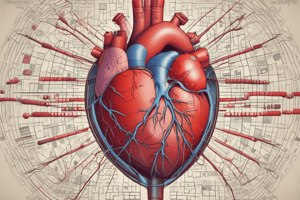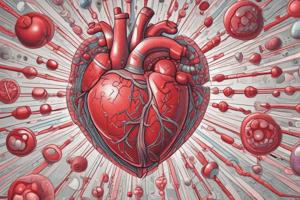Podcast
Questions and Answers
Which chamber does the mitral valve connect?
Which chamber does the mitral valve connect?
- Right atrium and right ventricle
- Left atrium and right ventricle
- Right atrium and left ventricle
- Left atrium and left ventricle (correct)
When does the mitral valve open?
When does the mitral valve open?
- During systole
- At the end of the cardiac cycle
- At the beginning of the cardiac cycle
- During diastole (correct)
What is the most common cause of mitral stenosis?
What is the most common cause of mitral stenosis?
- Rheumatic fever (correct)
- Congenital heart defect
- Hypertension
- Atherosclerosis
What are the typical characteristics of mitral valve leaflets in patients with mitral stenosis?
What are the typical characteristics of mitral valve leaflets in patients with mitral stenosis?
What is the function of the mitral valve during systole?
What is the function of the mitral valve during systole?
What is the natural history of mitral stenosis typically like?
What is the natural history of mitral stenosis typically like?
Which medication is used for rhythm control in atrial fibrillation?
Which medication is used for rhythm control in atrial fibrillation?
What is the primary prophylaxis for the prevention of rheumatic fever?
What is the primary prophylaxis for the prevention of rheumatic fever?
How long does secondary prevention continue in patients with carditis?
How long does secondary prevention continue in patients with carditis?
What complication is associated with mitral stenosis?
What complication is associated with mitral stenosis?
Which condition is NOT a common cause of mitral regurgitation?
Which condition is NOT a common cause of mitral regurgitation?
What causes acute mitral regurgitation?
What causes acute mitral regurgitation?
What is the primary etiology of chronic primary mitral regurgitation?
What is the primary etiology of chronic primary mitral regurgitation?
What is the most common cause of acquired mitral valve disease in the Western world?
What is the most common cause of acquired mitral valve disease in the Western world?
What is the pathophysiology of chronic decompensated mitral regurgitation?
What is the pathophysiology of chronic decompensated mitral regurgitation?
What is the prognosis of patients with acute regurgitation?
What is the prognosis of patients with acute regurgitation?
What causes MVP (mitral valve prolapse)?
What causes MVP (mitral valve prolapse)?
What complication can occur due to balloon valvulotomy in mitral stenosis?
What complication can occur due to balloon valvulotomy in mitral stenosis?
What is the definitive treatment for mitral regurgitation?
What is the definitive treatment for mitral regurgitation?
What is the primary aim of medical treatment for acute primary MR?
What is the primary aim of medical treatment for acute primary MR?
Which medication is used to reduce preload and the left ventricular volume?
Which medication is used to reduce preload and the left ventricular volume?
What should not be attempted to alleviate in patients with mitral regurgitation?
What should not be attempted to alleviate in patients with mitral regurgitation?
In which condition should cardioversion be considered for patients with mitral regurgitation?
In which condition should cardioversion be considered for patients with mitral regurgitation?
Which surgical treatment is considered the optimal choice for mitral regurgitation?
Which surgical treatment is considered the optimal choice for mitral regurgitation?
What is the mortality rate for patients with acute mitral regurgitation secondary to infarction requiring valve replacement and presenting with severe pulmonary edema?
What is the mortality rate for patients with acute mitral regurgitation secondary to infarction requiring valve replacement and presenting with severe pulmonary edema?
Which complication is not a major complication from chronic regurgitation?
Which complication is not a major complication from chronic regurgitation?
What type of approach is used for transcatheter mitral valve interventions?
What type of approach is used for transcatheter mitral valve interventions?
What is the primary aim of vasodilators in the management of acute heart failure?
What is the primary aim of vasodilators in the management of acute heart failure?
Which condition is an indication for surgical treatment of chronic primary MR?
Which condition is an indication for surgical treatment of chronic primary MR?
Which medication should be used to manage rapid atrial fibrillation secondary to chronic mitral regurgitation?
Which medication should be used to manage rapid atrial fibrillation secondary to chronic mitral regurgitation?
What is the most common cause of mitral stenosis?
What is the most common cause of mitral stenosis?
What is the normal area of the mitral valve orifice?
What is the normal area of the mitral valve orifice?
What occurs when the valve area is narrowed to less than 2.5 cm²?
What occurs when the valve area is narrowed to less than 2.5 cm²?
At what stage does critical mitral stenosis occur?
At what stage does critical mitral stenosis occur?
What is the 10-year survival rate of untreated patients with mitral stenosis?
What is the 10-year survival rate of untreated patients with mitral stenosis?
Where is the prevalence of rheumatic fever and mitral stenosis higher?
Where is the prevalence of rheumatic fever and mitral stenosis higher?
Which factor contributes to the decrease in the prevalence of mitral stenosis?
Which factor contributes to the decrease in the prevalence of mitral stenosis?
What is the gender difference in the prevalence of mitral stenosis?
What is the gender difference in the prevalence of mitral stenosis?
Which condition is NOT a cause of mitral stenosis?
Which condition is NOT a cause of mitral stenosis?
What might be present on physical examination of a patient with stenotic mitral valve?
What might be present on physical examination of a patient with stenotic mitral valve?
Which symptom is commonly associated with mitral stenosis?
Which symptom is commonly associated with mitral stenosis?
What might be a consequence of chronic elevation of pulmonary capillary pressure in mitral stenosis?
What might be a consequence of chronic elevation of pulmonary capillary pressure in mitral stenosis?
What is the diagnostic study of choice for mitral stenosis?
What is the diagnostic study of choice for mitral stenosis?
Which imaging technique provides better images of the mitral valve and is a more sensitive way to detect pathology such as valvular vegetations or atrial thrombus?
Which imaging technique provides better images of the mitral valve and is a more sensitive way to detect pathology such as valvular vegetations or atrial thrombus?
Which characteristic findings are associated with imaging studies of mitral stenosis?
Which characteristic findings are associated with imaging studies of mitral stenosis?
What is the most accurate noninvasive technique to quantify the hemodynamic severity of mitral stenosis?
What is the most accurate noninvasive technique to quantify the hemodynamic severity of mitral stenosis?
What does an ECG in a patient with significant mitral stenosis and sinus rhythm typically display?
What does an ECG in a patient with significant mitral stenosis and sinus rhythm typically display?
Which procedure is indicated when a discrepancy exists between Doppler-derived hemodynamics and the clinical status in a symptomatic patient?
Which procedure is indicated when a discrepancy exists between Doppler-derived hemodynamics and the clinical status in a symptomatic patient?
What is the initial procedure of choice for symptomatic patients with moderate-to-severe mitral stenosis?
What is the initial procedure of choice for symptomatic patients with moderate-to-severe mitral stenosis?
What intervention is recommended for patients with NYHA FC III-IV symptoms, moderate or severe mitral stenosis, and valve morphology favorable for repair or replacement?
What intervention is recommended for patients with NYHA FC III-IV symptoms, moderate or severe mitral stenosis, and valve morphology favorable for repair or replacement?
What is recommended for patients with moderate or severe mitral regurgitation?
What is recommended for patients with moderate or severe mitral regurgitation?
What does pregnancy cause in patients with mitral stenosis?
What does pregnancy cause in patients with mitral stenosis?
What is the most commonly successful way to convert atrial fibrillation to sinus rhythm?
What is the most commonly successful way to convert atrial fibrillation to sinus rhythm?
What therapy are medications directed at for mitral stenosis?
What therapy are medications directed at for mitral stenosis?
Which symptom is most likely to be present in patients with chronic mitral regurgitation?
Which symptom is most likely to be present in patients with chronic mitral regurgitation?
What is a common complication associated with left atrial enlargement in patients with chronic mitral regurgitation?
What is a common complication associated with left atrial enlargement in patients with chronic mitral regurgitation?
What is a characteristic physical finding in patients with severe chronic mitral regurgitation?
What is a characteristic physical finding in patients with severe chronic mitral regurgitation?
What is the most likely physical examination finding in acute mitral regurgitation?
What is the most likely physical examination finding in acute mitral regurgitation?
What imaging study is used to confirm the diagnosis of mitral regurgitation?
What imaging study is used to confirm the diagnosis of mitral regurgitation?
What is a common finding in the electrocardiogram (ECG) of patients with chronic mitral regurgitation?
What is a common finding in the electrocardiogram (ECG) of patients with chronic mitral regurgitation?
What is a common symptom in patients with MVP syndrome?
What is a common symptom in patients with MVP syndrome?
Which imaging study provides a better estimate of the severity of damage in mitral regurgitation?
Which imaging study provides a better estimate of the severity of damage in mitral regurgitation?
What is a common finding in the electrocardiogram (ECG) of patients with MVP?
What is a common finding in the electrocardiogram (ECG) of patients with MVP?
What is a characteristic physical finding in patients with MVP syndrome?
What is a characteristic physical finding in patients with MVP syndrome?
What is the most likely physical examination finding in chronic mitral regurgitation?
What is the most likely physical examination finding in chronic mitral regurgitation?
Flashcards are hidden until you start studying




